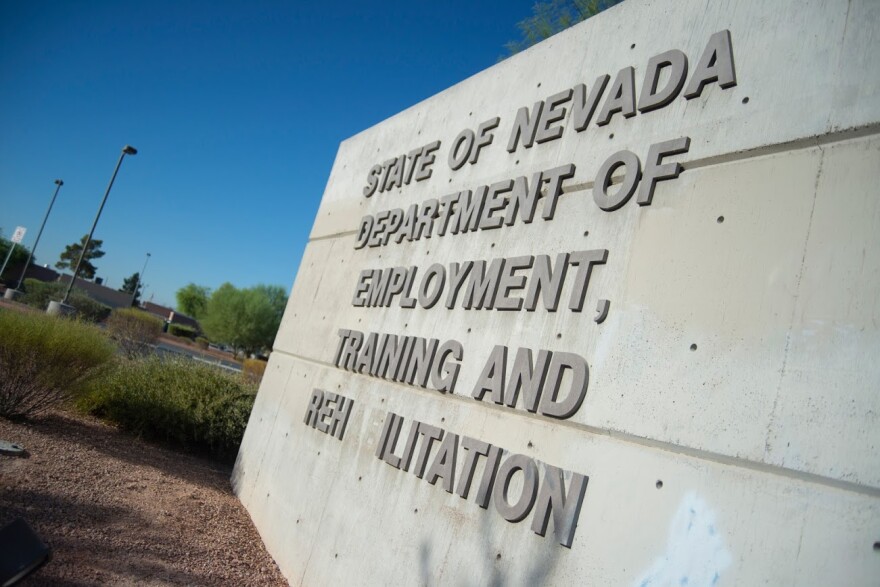With federal funding dried up, major Nevada unemployment claim backlog returns
By Tabitha Mueller, The Nevada Independent
Officials say the unemployment claims backlog is now as bad as it was earlier in the pandemic, as the state grapples with a drastically reduced unemployment workforce amid a dry-up of federal funding.
Officials with the Department of Employment, Training and Rehabilitation (DETR) said there’s a backlog of more than 33,000 unemployment claims as of March 1. That’s significant considering the state is receiving only about 8,000 new claims per month.
Only about 53% of claims are being paid within 14 days of the end of the first claimed week. The Department of Labor’s target is that 87 percent of claims are paid within two weeks.
The head of DETR said the agency is down almost 500 staff members because of changes in federal regulations not allowing for contract staff, reduced funding and employees returning to other government departments.
The backlog comes as Nevadans face punishing rent hikes, inflation and less generous benefits than earlier in the crisis.
You can read the rest of this story at The Nevada Independent.
Sen. Cortez Masto has big cash advantage over GOP hopefuls
By The Associated Press
The U.S. Senate race in Nevada is becoming expensive. Incumbent Democrat Catherine Cortez Masto holds a big financial advantage over two leading Republican hopefuls who each spent more than $1 million the first three months of 2022. Financial reports filed by April 15 show Cortez Masto raised a record $4.4 million for the quarter. She reported more than $11 million cash on hand.
Former Republican Attorney General Adam Laxalt raised almost $1.6 million and still had $2.2 million to spend. Sam Brown, a veteran and businessman from Reno, raised more than $1.1 million and spent almost $1.2 million during the period. He had about $680,000 cash on hand.
Median rent in Reno costs more than $1,600 a month
By Lucretia Cunningham
Inflation has affected everything from groceries to gas prices, and new data from Stessa, an online real estate platform, shows Reno has the 13th highest median rent costs out of all American mid-sized metro cities. Among over 380 total metro areas, Reno holds its place in the top 10%, with median costs estimated at more than $1,600. That’s about $200 more than the national average and surpasses the average rent in Las Vegas by more than $130.
The data also shows nine out of the top 10 states with the most expensive rent are coastal, like Massachusetts and New York. California, in particular, houses four of the five most expensive metro areas for rent, including San Jose, Calif., which is the only location in the U.S. where median rents are at about $3,000 per month.
NV Energy warns about phone scam
By Michelle Billman
NV Energy is reporting an increase in a new scam over the phone. The utility says the scammer is telling customers to pay immediately for a new NV Energy meter or a meter upgrade, threatening to disconnect their service if a payment is not made.
NV Energy officials want to remind everyone that they will never demand an immediate payment for any reason. Anyone at risk of having their power disconnected due to nonpayment receives a 10-day notice on their bill and a 48-hour notice in the mail. The utility does not accept payments using services like Zelle or Venmo and will not ask for credit card information over the phone.
If you receive a phone call from a scammer, you are encouraged to call local law enforcement and report the scam at nvenergy.com/scams.
A look at firefighting capacity in the Mountain West
By Emma Gibson, Mountain West News Bureau
At different points throughout the year, it may feel like your whole state or all of the Mountain West is on fire. But, officials say that during times of increased fire danger, they have a plan.
Wildfire season used to start in the spring, but now the danger is year-round. Those fighting the fires say there are enough teams to meet the need.
Jennifer Myslivy works for the Bureau of Land Management at the National Interagency Fire Center. She said the real focus is juggling and balancing the teams’ schedules.
“Really, what the problem is is when it gets into those heavy fire years, and those teams are being called back to back to back,” she said. “We’re trying to be able to give them a good work rest — time off — so that they’re not burned out.”
“Really, what the problem is is when it gets into those heavy fire years, and those teams are being called back to back to back, we’re trying to be able to give them a good work-rest — time off — so that they’re not burned out,” she said.
Myslivy also said with snow in the Northern Rockies now, it’s opened up teams to move to fires in the Southwest. However, when several states have fires, the teams lean on international or military partnerships.





